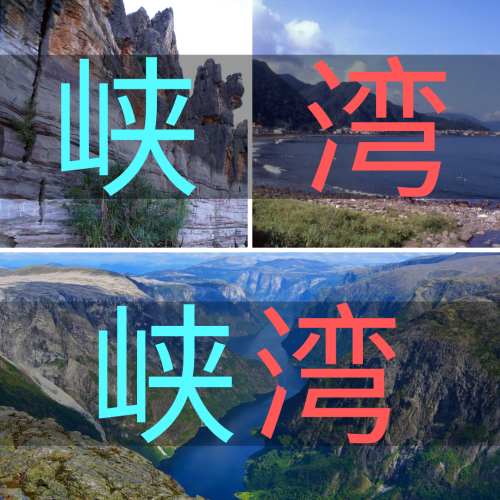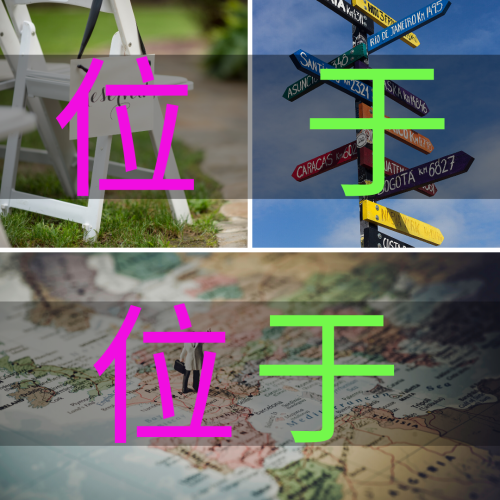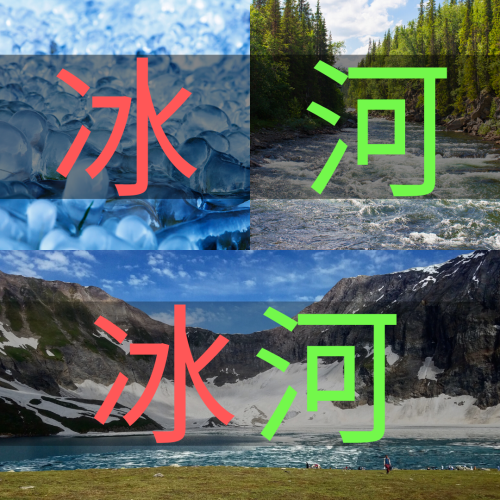#chinese vocabulary
I was reading an article in Chinese about climate changes and how it will influence sports. I found there very useful phrases that I wanted to share with you! You can use them during HSK 5 writing section (I think :D)
I do not post pinyin and meaning of words, everything is on the website (I suggest to sing up for it, it’s for free!)
ARTICLE (click)
Useful Phrases:
根据最新研究 … - according to the latest research…
(noun) 可能就是我们不断变化的气候的受害者之一 - (n) may be one of the victims of our changing climate
(noun) 可能会被淹没 - may be submerged
到本世纪末 - by the end of this century
到2050年,据估计 … - by 2050, it is estimated that…
全球温度的上升 - global temperature rises
面临着很大的挑战 - facing great challenges
解决方案在于减少人类的碳足印 - the solution lies in reducing human carbon footprint
米福尔德峡湾或称米佛峡湾是位于新西兰南岛西南部峡湾国家公园内的一处冰河地形。
米福尔德 mǐ fú ěr dé = Milford
峡湾 xiá wān = fjord
米佛mǐ fó = Milford
或称 huò chēng = also known as (HSK3)
位于wèi yú = to be located (位 mw for person HSK3)
新西兰xīn xī lán = New Zealand
南岛 nán dǎo = southern island
国家公园 guó jiā gōng yuán = national park
处 chǔ = measure word for location
冰河 bīng hé = glacier(河 HSK3)
地形 dì xíng = topography
Post link
女权主义 - [ Nǚquán zhǔyì ] - a feminism
女权主义者 - [ Nǚquán zhǔyì zhě ] - a feminist
女人味 - [ Nǚrén wèi ] - a femininity
行动主义 - [ Xíngdòng zhǔyì ] - an activism
性别 - [ Xìngbié ] - a gender
母道 - [ Mǔ dào ] - a maternity
骄傲 - [ Jiāo'ào ] -proud
尊重 - [ Zūnzhòng ] - to respect
爱 - [ Ài ] - to love
平等 - [ Píngděng ] - an equality
支持 - [ Zhīchí ] - to support
投票权 - [ Tóupiào quán ] - a voting right
有关系 - [ Yǒu guānxì ] - to matter
// if you have more vocab, share it please ^
In my last post about hello talk HERE
I discussed my experience with the app, all the useful phrases I had collected. From native speakers of the Chinese language. So I thought i’d compile another list, this time focusing on vocabulary around what the young people these days are using to text online, or say to each other!

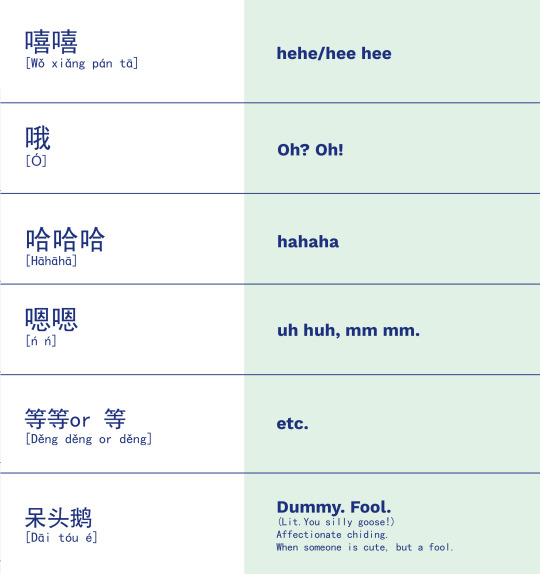
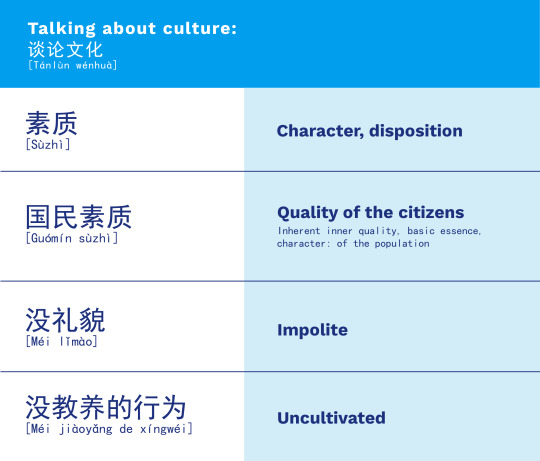
*for future reference the masterlist link should be under my profile pic on my homepage!
FLASHCARDS
C-SERIES INTEGRATED CONTEXT VOCAB
RADICAL VOCAB
HELLO TALK - Real life Chinese Conversations with Native Speakers
Part O1
OTHER VOCAB
EMOTIONS
APPEARANCE
What type of boys do you like?
What type of girls do you like?
CHINESE PARTICLES
MISCELLANEOUS VOCAB
01_My Mr. Mermaid + Body Parts
03_My Mr. Mermaid + Body Parts PT2
05_My Mr. Mermaid ep 3 + Chinese Pod describing drinks
06_PETS (describing animals/pets)
07_My Mr. Mermaid ep 4 + Home vocab
Sentence Order
Test Yourself:
Hello! This is all the Chinese learning content i’ve created so far! I hope you are all learning well and enjoying your language journeys!
❤️❤️❤️❤️❤️❤️❤️
So I was sick of being stuck behind my computer, learning and writing vocab, but not being able to talk to anyone in Chinese. I was looking around and thought i’d try this app called HELLO TALK. I’ve had it for two days so far!
Essentially it connects you with someone across the world who has your target language in their mother tongue. And ideally you’d have their target language as your mother tongue. And the language exchange begins!
Ofc there’s a bit of filtering to do, with people who aren’t willing to help you with your language and only want to speak in English. But once you find someone who has the same language learning goals as you it’s a matter of jumping straight into it. Try texting them in a mix of english/chinese and you can send back and forth voice memos to ask questions and improve eachother’s pronunciation :)
Here is some key vocab points and some of the things I got asked and discussed from my language exchange with a guy from Beijing and a girl from Hainan and many others :)
Even though there is a language translate function, it runs out after 15 goes if you have a free account. So I found myself forced to put things into google translate and look up things in the PLECO dictionary. Most, if not all of these sentences came from the native Chinese speakers on the app! So this is Chinese vocab in its most natural expression!
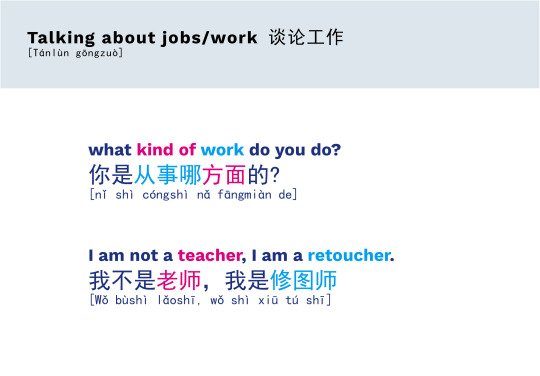
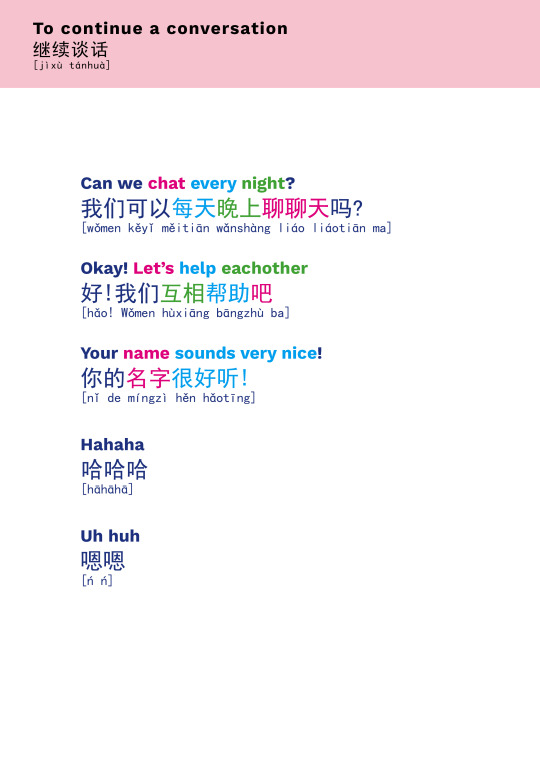
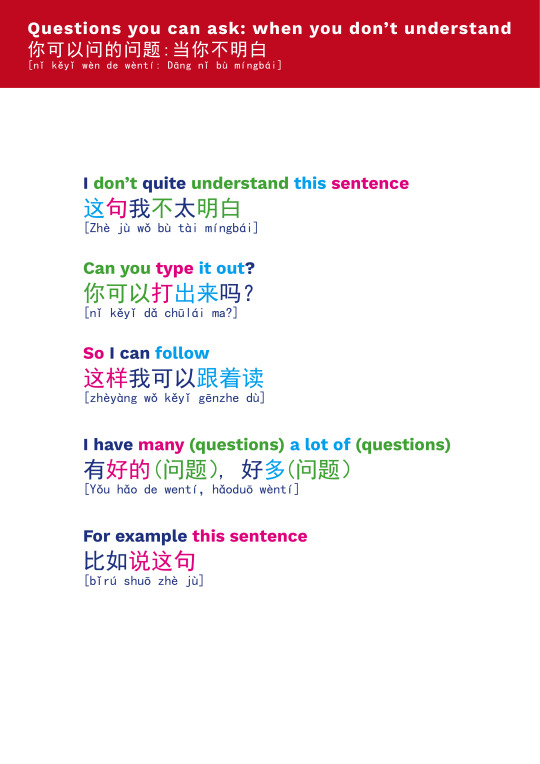


BONUS SENTENCES:
Asking your language partner to say things in English/Chinese
1. Please say this sentence in English/Chinese
请用英文/中文说这句话
Qǐng yòng yīngwén/zhōngwén shuō zhè jù huà
Setting a timeframe for your language exchange
1. Let’s talk for an hour!
一小时久 我们说吧!
Yī xiǎoshí jiǔ wǒmen shuō ba!
久: particle for duration of time
2. Let’s talk for half an hour!
半个小时久,让我们聊聊吧!
Bàn gè xiǎoshí jiǔ, ràng wǒmen liáo liáo ba!
3. I don’t have much time
我没有太多时间
Wǒ méiyǒu tài duō shíjiān
4. I have to go to sleep now
我现在必须去睡觉了
Wǒ xiànzài bìxū qù shuìjiàole
Thought i’d try a slightly different approach, particularly for the nouns to remember them. By breaking down individual meanings of the radicals within each character + pairing with a context driving trigger sentence. With Chinese, the radicals tell a story of how the word came to be, so perhaps looking at Chinese characters through that approach will encourage another level of long-term memory.
**Radical meanings are in bold + the vocabulary is CAPITALISED

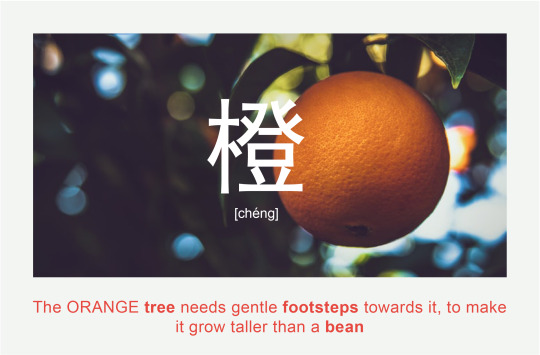
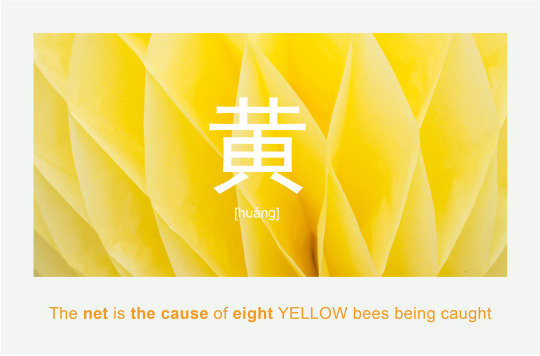




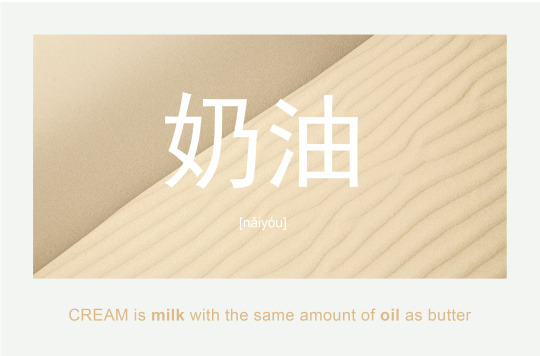
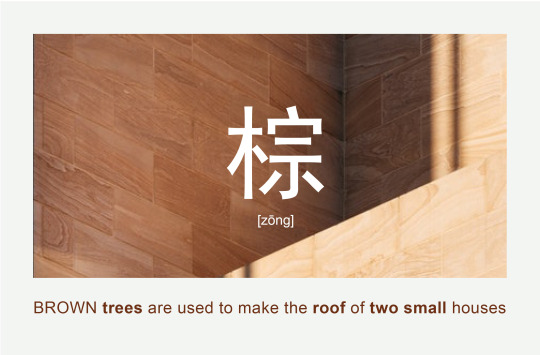
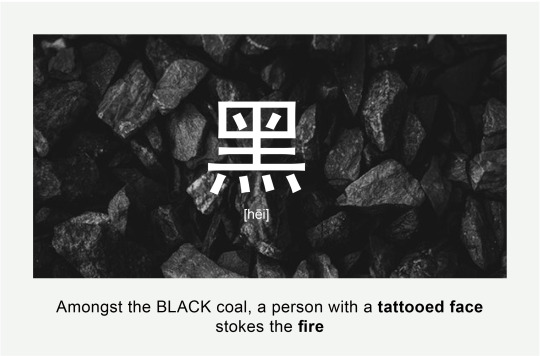
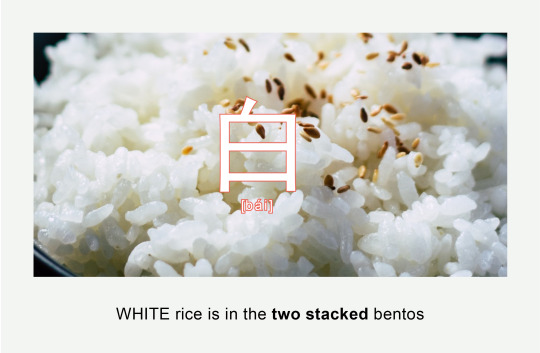

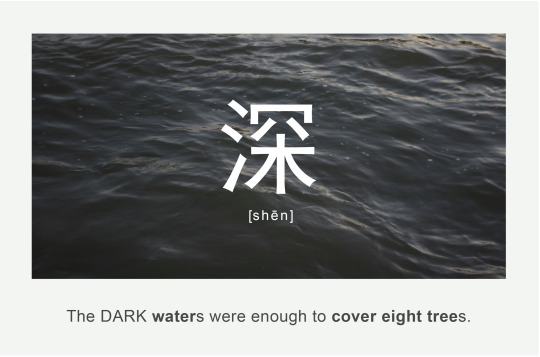
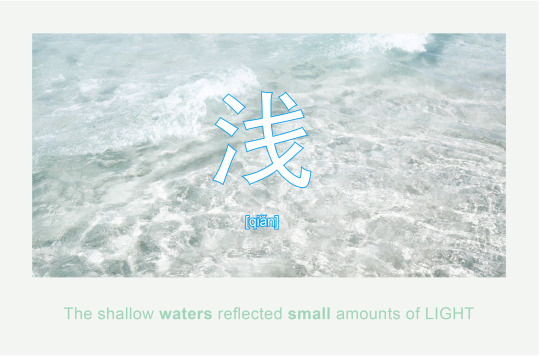
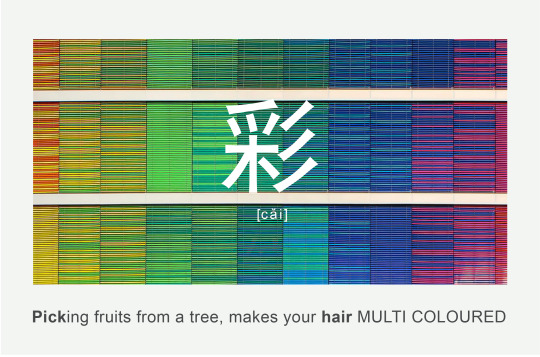
Thought i’d try a slightly different approach, particularly for the nouns to remember them. By breaking down individual meanings of the radicals within each character + pairing with a context driving trigger sentence. With Chinese, the radicals tell a story of how the word came to be, so perhaps looking at Chinese characters through that approach will encourage another level of long-term memory.
**Radical meanings are in bold + the vocabulary is CAPITALISED


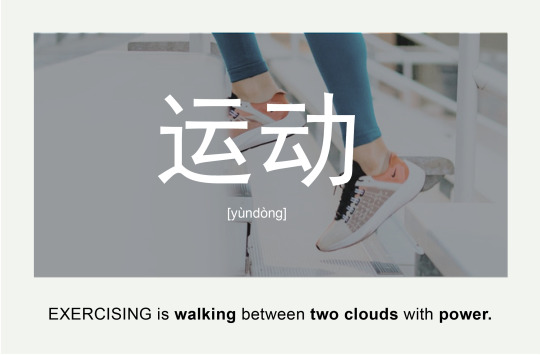

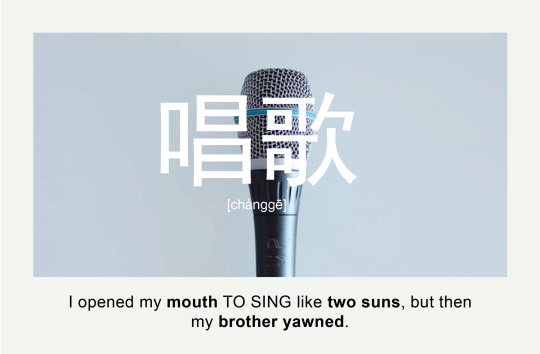

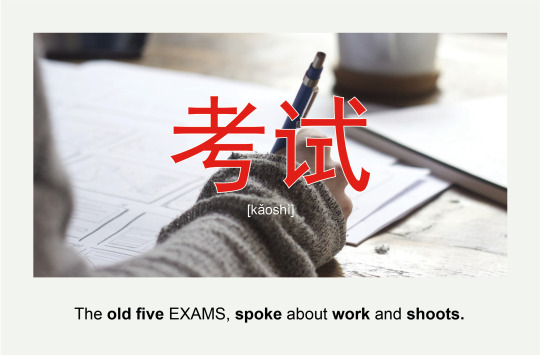



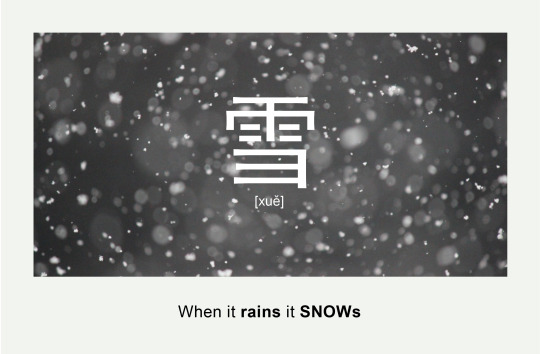
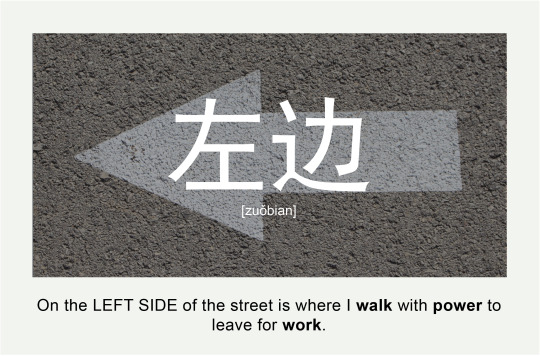

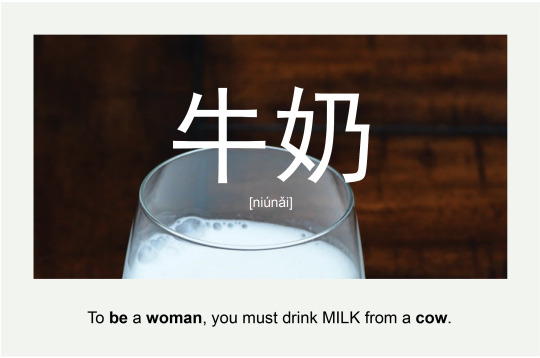
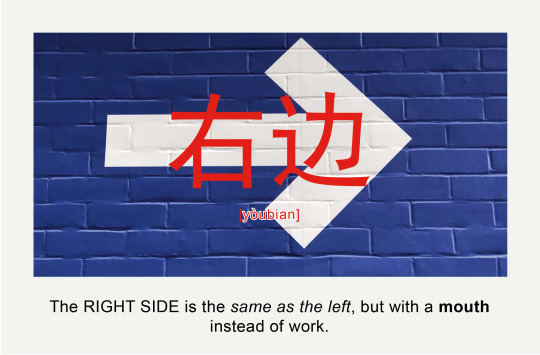


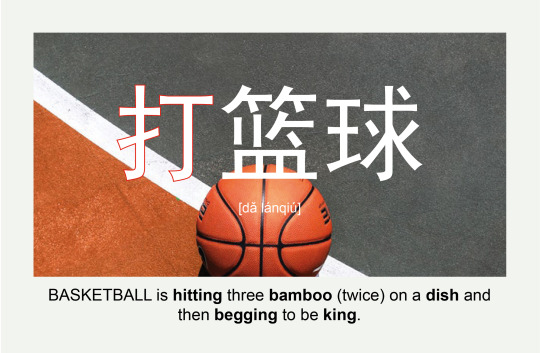

别让爱熄灭 DON’T LET MY LOVE DIE OUT
尽头是永远 THE END IS FOREVER
这爱太绝对 THIS LOVE IS TOO PERFECT
不会再重演 IT WON’T COME AGAIN
熄灭 xímiè to stop burning / to go out (of fire) / to die out
熄:to stop burning / to go out (of fire, lamp etc) / to come to an end: semantic 火 (pictographic representation of a fire, huǒ) + phonetic 息 (自 “nose” + 心 “heart” – to breath (life) through one’s nose, breathe, xī)
灭:to extinguish or put out:simplified from 滅:semantic 氵“water” + phonetic 烕 “destroy” (miè) – to destroy with water. 烕 considered to be an ideogrammic compound: 戌 “ninth month” + 火 “fire”, probably alluding to a passage in Huainanzi (an ancient Chinese text that consists of a collection of essays that blends Daoist, Confucianist, Buddhist and Legalist concepts):
火生於寅,壯於午,死於戌 [Classical Chinese, trad.]
Huǒ shēng yú yín, zhuàng yú wǔ, sǐ yú xū
Fire is born in the first month, is strong in the fifth month,
and dies in the ninth month.
水会流失,火会熄灭,而爱情却能和命运抗衡。
Water will run off, the fire will go out, but love can compete with fate.
尽头 jìntóu end / extremity / limit
尽:to use up / to end / to finish:simplified from 盡 “to end” (jìn)
头:head / hair style / the top / beginning or end:simplified from 頭 - phono-semantic compound: phonetic 豆 (some kind of container, dòu) + semantic 頁 (head of a kneeling person, emphasising “head”, yè)
蓝蓝的天空仿佛是一片没有尽头的大海。
The blue sky is like a sea without end.
绝对 juéduì absolute / unconditional
绝:to cut short / to disappear / to vanish:simplified from 絕 - phono-semantic compound: semantic 糹(pictogram “silk”, mì) + semantic 刀 (pictogram “knife”, dāo) + phonetic 巴 (pictogram of a a kneeling person, jié) — to cut silk threads.
对:right / correct / opposite /to match together / to adjust / to fit:simplified from 對 (duì)(more about this character)
世界上绝对静止的东西是没有的。
There is nothing in the world that is absolutely static.
重演 chóngyǎn a repeat performance / repeat occurrence
重:to repeat / repetition / again / re-: from phono-semantic compound: semantic 人 (side view of a standing man, highlighting the arms and legs, “man”, rén) + phonetic 東 (”bag”,dōng). Also ideogrammic compound – a man carrying a bag. Another pronunciation: zhòng - heavy.
演: to practice / to perform / to play / to act: phono-semantic compound: semantic 氵“water” + phonetic 寅 (yín).
历史的悲剧总是会重演。
The tragedy of history will always repeat itself.
Give yourself a break ☆
Please, don’t forget, it’s OK to give yourself some time to rest. Take your time.

<Jonghyun - Maybe Tomorrow>
It’s okay to cheer up by tomorrow
明天加油也可以
Míngtiān jiāyóu yě kěyǐ
No, it’s fine even by the day after tomorrow
不,后天开始也可以
bù, hòutiān kāishǐ yě kěyǐ
We can’t be having fun everyday as we live
我们不能每天都开心,
wǒmen bùnéng měitiān doū kāixīn,
We won’t be tearing for a lifetime either
也不会终生都流泪
yě bú huì zhōngshēng dōu liúlèi
Sometimes I wonder, why am I the only one who isn’t doing well
有时候在想,为什么只有我不行,
yǒu shíhòu zài xiǎng, wèishéme zhǐyǒu wǒ bùxíng,
Feel bitter and pain
又苦涩又痛苦
yòu kǔsè yòu tòngkǔ
When it’s stifling, when it’s frustrating
压抑的时候,茫然的时候
yāyì de shíhòu, mángrán de shíhòu
It’s not that bad to waste it like that for once
就这样放弃一次,也不是很坏
jiù zhèyàng fàngqì yīcì, yě búshì hěn huài
It’s OK, it’s OK
没关系,没关系
méiguānxì, méiguānxì
It’s OK to rest
休息也可以
xiūxí yě kěyǐ
Vegetarianism 素食主义者 sùshí zhǔyì zhě
Veganism 纯素主义 chún sù zhǔyì
I am a vegetarian. 我是一个素食者。 Wǒ shì yīgè sùshí zhě.
I do not eat meat. 我不吃肉。 Wǒ bù chī ròu.
I eat eggs and dairy products. 我吃鸡蛋和奶制品。 Wǒ chī jīdàn hé nǎi zhìpǐn.
I am a vegan. 我个是纯素者。Wǒ shì gè chún sù zhě.
I do not eat eggs or dairy products at all. 我根本不吃鸡蛋或乳制品。 Wǒ gēnběn bù chī jīdàn huò rǔ zhìpǐn.
Do you have any vegetarian (vegan) dishes? 你们有素食(纯素食)菜吗? Nǐ men yǒu sùshí (chún sùshí) cài ma?
纯素主义是一种生活方式,志在尽可能排除对动物的所有剥削虐待。
Chún sù zhǔyì shì yī zhǒng shēnghuó fāngshì, zhì zài jǐn kěnéng páichú duì dòngwù de suǒyǒu bōxuè nüèdài.
Veganism is a way of life, aiming to eliminate all exploitation and abuse of animals as much as possible.
动物产品 包含所有形式的 Animal products includeall forms of
Dòngwù chǎnpǐn bāohán suǒyǒu xíngshì de
肉 ròu meat
禽 qín birds
鱼 yú fish
贝 bèi shell
蛋 dàn eggs
乳制品 rǔ zhìpǐn dairy products
毛皮 máopí fur
皮革 pígé leather
毛料 máoliào wool
昆虫产品 kūnchóng chǎnpǐn insect products
丝 sī silk
蜂蜜 fēngmì honey
副产品例如 fùchǎnpǐn lìrú by-products such as
明胶 míngjiāo gelatin
凝乳 níng rǔ curd
乳清 rǔ qīng whey
祝你…/希望你…+
(zhù nǐ… / xīwàng nǐ…) wish you… / may you…
basic:
- 幸福(安康) xìngfú(ānkāng) happiness (and good health)
- 好运绵长 hǎo yùn miáncháng good luck lingering
- 快乐无疆 kuàilè wújiāng happiness without borders
- 天天开心 tiān tiān kāi xīn be happy everyday
- 新年/中秋节… 快乐 xīn nián / zhōng qiū jié … kuài lè
Happy New Year / Mid-Autumn Festival..
with … 顺利/顺心 … shùn lì / shùn xīn
smoothly/be satisfactory
- 一切顺心 yī qiè shùn xīn (may you) everything go well
- 工作顺利 gōng zuò shùn lì work go well
- 感情顺利 gǎn qíng shùn lì love go well
- 考试顺利 kǎo shì shùn lì exams go well
- 生活顺利 shēng huó shùn ltì life go well
工作 - gōngzuò - work
- 早日升迁 zǎorì shēngqiān to get promotion earlier
- 步步高升 bùbùgāo shēng to attain eminence step by step
- 再展宏图 zài zhǎn hóngtú realize one’s ambition
- 在任功成绩高 zàirèn gōng chéngjī gāo
high performance in the work - 芝麻开花节节高 zhīma kāihuā jié jié gāo
be like sesame in bloom, each flower grows higher than the last
生日 - shēngrì - birthday
- 生日快乐 shēngrì kuàilè happy birthday
- 长命百岁 cháng mìng bǎi suì may you live a hundred years
- 永远年轻 yǒngyuǎn niánqīng may you be young forever
- 过着幸福生活 guò zhe xìngfú shēnghuó live a happy live
- 未来的日子与以往一样快乐 wèilái de rìzi yǔ yǐwǎng yīyàng kuàilè
the days ahead are as happy as ever
感情 - gǎnqíng - love
- 有情人终成眷属 yǒuqíng rén zhōng chéng juànshǔ
lovers finally get married - 永浴爱河 yǒng yù àihé to bathe in the river of love forever
- 早生贵子 zǎoshēng guìzǐ to have a dear son soon
- 携手共渡美丽人生 xiéshǒu gòngdù měilì
rénshēng join hands to live a beautiful life - 愿爱洋溢在你甜蜜的生活中
yuàn ài yángyì zài nǐ tiánmì de shēnghuó zhōng
May love overflow in your sweet life.
学业 - xuéyè - studies
- 学业进步 xuéyè jìnbù to progress one’s studies
- 金榜题名 jīnbǎng tímíng to succeed in exam
- 取得丰硕的成果 qǔdé fēngshuò de chéngguǒ
score great successes - 将来造福社会 jiānglái zàofú shèhuì
to benefiting society in the future - 大学生活缤纷绚烂 dàxué shēnghuó bīnfēn xuànlàn
the university life to be gorgeous

对我而言,你只是一个小男孩,
Duì wǒ ér yán, nǐ zhǐshì yīgè xiǎo nánhái,
To me, you are still nothing more than a little boy
和其他成千上万的小男孩没有什么不同。
hé qítā chéng qiān shàng wàn de xiǎo nánhái méiyǒu shé me bùtóng.
who is just like a hundred thousand other little boys.
我不需要你。And I have no need of you.
Wǒ bù xūyào nǐ.
你也不需要我。And you, on your part, have no need of me.
Nǐ yě bù xūyào wǒ.
对你而言,我也和其它成千上万的狐狸并没有差别。
Duì nǐ ér yán, wǒ yě hé qítā chéng qiān shàng wàn de húlí bìng méiyǒu chābié.
To you, I am nothing more than a fox like a hundred thousand other foxes.
但是,假如你驯服了我,我们就彼此需要了。
Dànshì, jiǎrú nǐ xùnfúle wǒ, wǒmen jiù bǐcǐ xūyàole.
But if you tame me, then we shall need each other.
对我而言,你就是举世无双的;对你而言,我也是独一无二的。
Duì wǒ ér yán, nǐ jiùshì jǔshì wúshuāng de; duì nǐ ér yán, wǒ yěshì dúyīwú'èr de.
To me, you will be unique in all the world; to you, I shall be unique in all the world.
而言 ér yán - to be regarding; to be in terms of; to be speaking of; to be as far as something is concerned.
而言 (éryán) is always put at the end of a sentence structure which starts with a preposition, such as 对于 (duìyú, “regarding”), 就 (jiù, “in [terms of]”) or 从 (cóng, “from”), or is collocated with 相比 (xiāngbǐ, “comparison”).
其他成千上万 qítā chéng qiān shàng wàn - thousands of others (其他 other / (sth or sb) else / the rest + 成千上万 lit. by the thousands and tens of thousands (idiom); untold numbers / thousands upon thousands)
并没有差别:
One of the many uses of 并 (bìng) is to add emphasis to a sentence that uses 不 or 没. Because you’re emphasizing a negation, 并 is often used when expressing disagreement, or pointing out a flaw in someone’s argument. You can take pretty much any sentence with a negated verb,and give it a little extra kick with 并. Just put it before the 不 or 没. Note that when used with 不, you can negate an adjective as well.
假如你驯服了我,我们就彼此需要了:
“假如⋯⋯,就⋯⋯” (jiǎrú…, jiù…) is yet another way to express “If…, then…” in Chinese, but it is much more formal than 要是 or 如果 are (in both written and spoken Chinese).
举世无双 jǔshì wúshuāng - unrivalled (idiom); world number one / unique
独一无二 dúyīwú'èr - unique and unmatched (idiom); unrivalled / nothing compares with it
狐狸 húlí - fox
驯服 xùnfú - tame
彼此 bǐcǐ - each other
自我介绍 self-introduction
1. 姓名 (xìngmíng)surname and name
- 请问 + 您/你/他/这位 + 怎么称呼/叫什么名字?
- 我/他/这位 + (的名字)叫/叫做/是 + 【姓名】
- 我/他/这位 + 姓 + 【姓】
称呼 (chēnghū) to call; to address (of people’s names and titles)
✎ 您怎么称呼 - How can I address you? (more formal way to ask name, when you want to show your respect to someone, you can use this expression)
✎ First - surname, then - name. Eng.: John Smith, 中文:Smith John
✍ 请问,您怎么称呼?- 我姓周。
✍ 请问,你叫什么名字?- 我叫周子芸。
2. 国籍(guójí)nationality
- 请问 + 你/您 是哪里人?
+ 他/这位 来自哪里?
- 我/他/这位 + 是 + 【国家】人。
- 我/他 + 来自 +【国家】。
✍ 请问,这博客写手(bókè xiěshǒu blogger) 来自哪里?- 她来自俄罗斯。
3. 职业 (zhíyè)occupation / profession
- 请问 + 你/您/他 + 在哪里 + 念书/工作?
- 我/他 + 是/是个/是位 + 学生/医生/家庭主妇。
- 我/他 + 在 + 【大学/公司名字】+ 念书/上班/工作。
✍ 请问您在哪里工作?- 我是个学生,在马萨里克大学念书。
4. 年龄 (niánlíng)(a person’s) age
- 请问 + 您/你/他 +(今年)+ 几 + 岁?
- 我/他 +(今年)+ 【年龄】+ 岁。
✍ 请问,您几岁?- 我今年二十三岁。
✎ 年龄 (niánlíng) and 年纪 (niánjì) are different in that the former can refer to the age of a person, plant or heavenly body, while the latter can only refer to the age of a person.
Task/任务:请你自我介绍一下!
Example/例子:
你好!我叫Kate,我中文名是瑟琳。我来自俄罗斯,可是现在我住在捷克。我是个学生,我的专业是中文。今年我二十三岁了。

迷途闯入了
mítú chuǎng rù le
GOT LOST
森林之中
sēnlín zhī zhōng
IN THE HEART OF A FOREST
你找不到回去的路
nǐ zhǎo bù dào huíqù de lù
YOU CAN’T FIND THE WAY BACK
月光的晶莹
yuèguāng de jīngyíng
SPARKLING AND TRANSLUCENCE OF MOONLIGHT
星星的模样
xīngxīng de múyàng
THE LOOK OF THE STARS
你通通看不见
nǐ tōngtōng kàn bùjiàn
YOU CAN’T SEE ANYTHING
一直在哭
yīzhí zài kū
CAN’T STOP CRYING
在同一个地方
zài tóng yīgè dìfāng
AT THE SAME PLACE
反覆徘徊
fǎnfù páihuái
REPEAT OVER AND OVER
自己来自哪里?
zìjǐ láizì nǎlǐ?
WHERE DO YOU COME FROM?
要往何处去?
yào wǎng hé chù qù?
WHERE ARE YOU GOING?
这时候
zhè shíhòu
AT THIS MOMENT
不妨侧耳倾听
bùfáng cè'ěr qīngtīng
IT WOULDN’T HARM TO LISTEN ATTENTIVELY
试着倾听内心的声音
shìzhe qīngtīng nèixīn de shēngyīn
TRY LISTENING TO YOUR INNER VOICE
SHINee-I’m with you
迷途闯入 lit. enter (闯入) the wrong path (迷途)
回去的路 the way that leads back (verb+complement (回去 to go back) + 的 = attribute of a noun)
晶莹 sparkling and translucent (晶 crystal + 莹 luster of gems)
模样 looks, appearance (模 imitate; model; norm + 样 manner; pattern; way)
通通 all; entirely; completely
一直 all along; always; constantly
反覆 to go back and forth; to recur; to back out
徘徊 to pace back and forth; (figuratively) to linger; to hover around
往何处去: 往 towards + 何处 where + 去 go
不妨 there is no harm in; might as well (妨 hinder; harm)
侧耳 (literary) to lean(侧) in and listen; to listen carefully; to listen attentively
倾听 to listen attentively
内心的声音 inner voice (内心 heart; innermost being)
Lee Hi - Breath
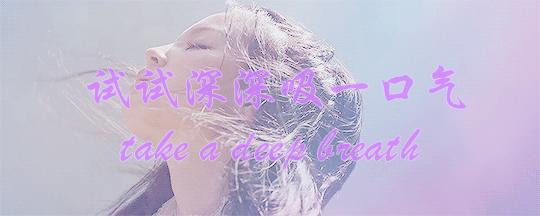
try to take a deep breath
试试深深吸一口气 shì shì shēn shēn xī yī kǒuqì
until both sides of your chest
直到你的胸口两侧 zhídào nǐ de xiōngkǒu liǎng cè
slightly feel pain and paralysis
稍稍感到疼痛麻痹为止 shāoshāo gǎndào téngtòng mábì wéizhǐ
try to split it out again
试试再吐出一口气 shì shì zài tǔchū yī kǒuqì
until feeling
直到感到 zhídào gǎndào
that nothing is left inside
在你的里面什么都没有为止 zài nǐ de lǐmiàn shénme dōu méiyǒu wéizhǐ
试试 - try (verbs can be reduplicated to indicate that they happen briefly or “a little bit.”)
深深 - deaply, keenly, profoundly
吸 - inhale, breath in, absorb
吸一口气 - take a deep breath
两侧 - two sides, both sides
稍稍 - a little, a bit, slightly
感到 - to feel, to sense (感 sense + 到 a verb complement to show the result of an action/to get)
直到…为止 - until
吐 - to spit, to put, to say (+complement 出 = split out)
我会努力让这个世界变得更美好。
Wǒ huì nǔlì ràng zhège shìjiè biànde gèng měihǎo.
努力 nǔlì
verb: to make great efforts, try hard, exert oneself;
adj.: strenuous, srduous.
让/讓 ràng
to yield, to permit, to let sb do sth, to have sb do sth, to make sb (feel sth, etc);
causative verb, is used to cause or influence people to do things. In English, these are verbs like “make,” “let,” “have,” and “get,” as in “get Billy to eat dinner.” Subject + 让 + Object + Predicate: 我…让…世界变得…
变得 / 變得 biànde
变(to change; to become different; to transform)+ 得(get; obtain; gain)
to become something,to change mood or appearance.
美好 měihǎo
美(beautiful; beauty)+ 好(good; well; be fond of)
fine; glorious; happy.
为了你。
SHINee’s Jonghyun - The End Of A Day
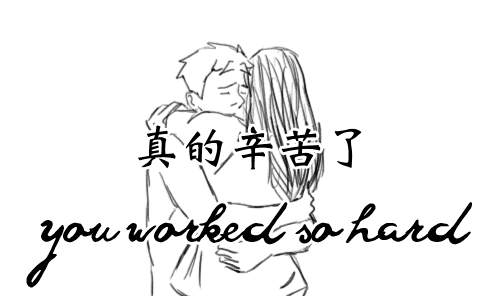
Hold out your hand, wrap it around my neck
伸出你的手 拥抱着我的脖子
shēn chū nǐ de shǒu yǒngbàozhe wǒ de bózi
A little below, massage my shoulders
再向下一点 替我按摩肩膀
zài xiàng xià yīdiǎn tì wǒ ànmó jiānbǎng
At the end of a tiring day
疲劳的一天过去了
píláo de yītiān guòqùle
Even if the sun has already come up
太阳已经下山
tàiyáng yǐjīng xiàshān
I’m finally closing my eyes
我却现在才闭上双眼
wǒ què xiànzài cái bì shàng shuāngyǎn
I close the door to my day later than others
我的一天比起别人更晚结束
wǒ de yītiān bǐ qǐ biérén gèng wǎn jiéshù
Playfully tickle my earlobe
调皮在我耳垂挠痒痒
tiáopí zài wǒ ěrchuí náo yǎngyang
Because even though we’ve been in different worlds all day
虽然我们一天到晚身处不同之处
suīrán wǒmen yītiān dào wǎn shēn chǔ bùtóng zhī chù
We always end the day together
却总是在每天结束时在一起
què zǒng shì zài měitiān jiéshù shí zài yīqǐ
Your small shoulders, your small hands
你那小小的肩膀 你那小巧的双手
nǐ nà xiǎo xiǎo de jiānbǎng nǐ nà xiǎoqiǎo de shuāngshǒu
Becomemy cozy blanket at the end of a tiring day
成为了我疲惫的一天结束时柔软的被子
chéngwéile wǒ píbèi de yītiān jiéshù shí róuruǎn de bèizi
You did a good jobtoday,you worked so hard
辛苦了真的辛苦了
xīnkǔle zhēn de xīnkǔle
I hope my shoulders and my thick hands
我也希望我的肩膀 我那粗糙的双手
wǒ yě xīwàng wǒ de jiānbǎng wǒ nà cūcāo de shuāngshǒu
Will become cozy comfort for the end of your tiring day as well
成为你一天结束时温暖的安慰
chéngwéi nǐ yītiān jiéshù shí wēnnuǎn de ānwèi
I want to naturally sync my breathing with yours
想和你自然地喘口气
xiǎng hé nǐ zìrán de chuǎn kǒuqì
Like water in a bathtub that wraps around you with no space left
就像紧紧包裹你的浴池中的温水
jiù xiàng jǐn jǐn bāoguǒ nǐ de yùchí zhōng de wēnshuǐ
(I wanna hold you) warmly without any space left
温暖的 又无微不至
wēnnuǎn de yòu wúwēibùzhì
At the end of my day, filled with awkward mistakes
在我那充满失误的狼狈的一天结束时
zài wǒ nà chōngmǎn shīwù de lángbèi de yītiān jiéshù shí
You, my pride, are waiting for me
值得骄傲的你却在等待着我
zhídé jiāo'ào de nǐ què zài děngdàizhuó wǒ
I can’t cry all I want or even laugh all I want
无法随心所欲的哭笑的一天
wúfǎ suíxīnsuǒyù de kū xiào de yītiān
At the end of a tiring day but still, if I’m next to you
疲惫的一天结束只要你在身边
píbèi de yītiān jiéshù zhǐyào nǐ zài shēnbiān
Like a child, I can whine and then laugh till I run out of breath
我就可以像孩子一样随心所欲的哭笑
wǒ jiù kěyǐ xiàng háizi yīyàng suíxīnsuǒyù de kū xiào
I can also face my true self
我也可以面对真实的自己
wǒ yě kěyǐ miàn duì zhēnshí de zìjǐ
You did a good job today, you worked so hard
辛苦了 真的辛苦了
xīnkǔle zhēn de xīnkǔle
You are my pride
你是我的骄傲啊
nǐ shì wǒ de jiāo'ào a
Please let me know if you like this format, and any suggestions how to make it better are welcomed, thank you ♡
Xìng shēnfèn
性 - nature / character / sexuality / sex / gender
身份 - identity / status

性取向 - xìng qǔxiàng - sexual orientation
Asexual - 无性恋 - wúxìng liàn
Bisexual - 双性恋 - shuāng xìng liàn
Heterosexual - 异性恋 - yìxìng liàn
Homosexual - 同性恋 - tóngxìngliàn
Lesbian - 女同性恋 - nǚ tóngxìngliàn
Gay - 男同性恋 - nán tóngxìngliàn
Non-heterosexual - 非异性恋 - fēi yìxìng liàn
Pansexual - 泛性恋 - fàn xìng liàn
Polysexual - 多性恋 - duō xìng liàn
Queer - 酷儿 - kù er
性别认同 - xìngbié rèntóng - gender identity
Agender - 无性别 - wú xìngbié
Androgyne - 双性性格 - shuāng xìng xìnggé
Bigender - 双性别 - shuāng xìngbié
Cissexual - 顺性别 - shùn xìngbié
Genderqueer, gender-fluid - 性别酷儿 - xìngbié kù er
Pangender - 泛性别 - fàn xìngbié
Transgender - 跨性別 - kuà xìngbié
Trans man - 跨性别男性
Trans woman - 跨性别女性
Trigender - 三性别 - sān xìngbié
10.October - World Mental Health Day
Shí yuè shí hào - Shìjiè jīngshén wèishēng rì
世界 shìjiè world
精神卫生 jīngshén wèishēng mental health

anorexia - 厌食症 yànshízhèng
厌 - to loathe
食 - to eat, food
症 - disease, illness
厌食症不是闹着玩的,不是你想得就能得的。
anxiety - 焦虑(症)jiāolǜ
焦 - burnt, worried, anxious
虑 - to think over, to consider, anxiety
焦虑症发作 - an anxiety attack
急性焦虑症 (jíxìng) - acute anxiety disorder
大部分人一生中都会经历不同程度的焦虑,但急性焦虑却会让人感到束手无措。
autism - 自闭症 zìbì /孤独症 gūdú
自 - self, oneself
闭 - to close, to stop up, to shut, to obstruct
孤 - lone, lonely
独 - alone, independent, single, sole, only
自闭症的孩子只是不爱说话、比较孤僻,其实是隐藏的天才。
bipolar disorder - 躁郁症 zào yù zhèng
躁 - hot-tempered, impatient
郁 - dense (growth), melancholy
凡高很有可能同时患有癫痫及躁郁症。
dementia - 痴呆症 chīdāi
痴 - imbecile, sentimental, stupid, foolish, silly
呆 - foolish, stupid, expressionless, blank, to stay
老人痴呆症* - Alzheimer’s Disease*
痴呆症患者常常无法获得其他人享有的基本权利和自由。
depression - 抑郁症 yìyù
抑 - to restrain, to restrict, to keep down
世卫组织称,全球范围内,共有超过3.5亿人患有抑郁症,遍布各个年龄组。
obsessive-compulsive disorder (OCD) - 强迫症 qiángpò
强 - strong, powerful, vigorous, violent, best in their category
迫 - to force, to compel, to approach or go towards, urgent, pressing
强迫行为是我们的自我保护方式,并不是坏的东西。
panic attack - 恐慌发作 kǒnghuāngfāzuò
恐 - afraid, frightened, to fear
慌 - to get panicky, to lose one’s head
恐慌 - panic, panicky, panic-stricken
发作 - to flare-up, to break out
虽然每位病人的恐慌发作时感受都有不同,但有一点是相同的:恐慌发作非常吓人。
phobia - 恐惧症 kǒngjù
惧 - to fear
恐惧 - fear, dread, phobia
患有社交恐惧症的人一想到要见陌生人就发抖。
post-traumatic stress disorder - 创伤后压力紊乱 chuāngshāng hòu yālì wěnluàn
创 - a wound, cut, injury, trauma
伤 - to injure, injury, wound
创伤后 - post-traumatic
压 - to press, to push down, to keep under (control), pressure
力 - power, force, strength, ability, strenuously
压力 - pressure
紊乱 - disorder, chaos
在美国,每年约3.5%的成人罹患创伤后压力症。
schizophrenia - 精神分裂症 jīngshén fēnliè zhèng
精神 - spirit, mind, consciousness, thought, mental, psychological
分裂 - to split up, to divide, to break up, fission, schism
精神分裂症患者通常不知道自己病了。
*a useful note from rolandbarfs:痴呆 for Alzheimer’s is considered dated and pejorative (I’ve previously been told this by a Chinese mental health expert). A much more neutral, non-judgemental term is 阿滋海默症 — even Chinese state media tends to call it this now.

